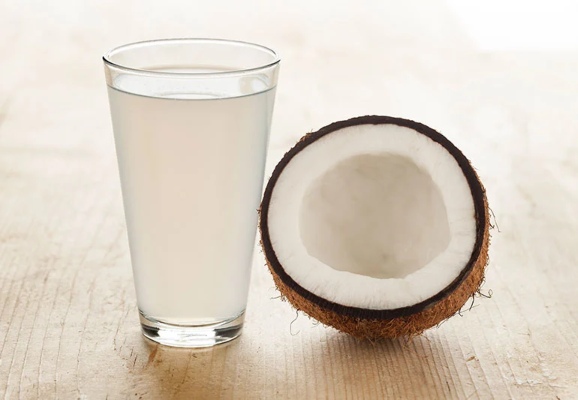Welcome to the world of coconut water, the naturally hydrating elixir that has surged in popularity for its refreshing taste and myriad health benefits. In this exploration, we’ll dive into the origins, nutritional composition, and the diverse uses that make coconut water a beloved beverage.
The Origin of Coconut Water
Nature’s Quench
Coconut water is the clear liquid found inside young, green coconuts. Historically a staple in tropical regions, it has been consumed for centuries as a natural way to stay hydrated, especially in areas where coconuts flourish.
Harvesting Process
The harvesting process involves selecting young coconuts, typically between 5-7 months of age, when the water content is at its peak. The coconuts are carefully opened to extract the refreshing liquid, ensuring purity and quality.
Nutritional Composition
Hydration Powerhouse
Coconut water is renowned for its exceptional hydrating properties. It is not only rich in water but also packed with essential electrolytes like potassium, sodium, and magnesium, making it a natural alternative to commercial sports drinks.
Low Calorie, High Nutrition
Unlike many sugary beverages, coconut water is low in calories and naturally free of fat and cholesterol. It is a guilt-free option for those looking to hydrate without compromising on nutrition.
Nutrient Profile
In addition to electrolytes, coconut water contains vital nutrients such as vitamins C and B-complex, amino acids, enzymes, and antioxidants. This diverse nutrient profile contributes to its reputation as a healthful beverage.
Health Benefits
Hydration and Electrolyte Balance
Coconut water’s electrolyte composition makes it an effective hydrating solution, especially after physical exertion. It aids in replenishing fluids and balancing electrolytes lost through sweat.
Heart Health
The potassium content in coconut water supports heart health by helping to regulate blood pressure. Incorporating it into a balanced diet may contribute to cardiovascular well-being.
Antioxidant Properties
The presence of antioxidants, such as cytokinins and bioactive enzymes, may help combat oxidative stress in the body, potentially reducing the risk of chronic diseases.
Culinary and Culinary Uses
Versatile Beverage
Coconut water is a versatile beverage that can be enjoyed on its own or as a base for smoothies and tropical cocktails. Its natural sweetness adds a refreshing twist to various drink concoctions.
Culinary Ingredient
Beyond beverages, coconut water has found its way into culinary creations. It serves as a flavorful addition to dishes like curries, rice, and desserts, infusing a subtle tropical taste.
Hydration in Fitness
Recognized as a natural isotonic drink, coconut water has become a favorite among fitness enthusiasts. Its hydrating properties make it an ideal companion for pre or post-workout sessions.
Sustainable and Eco-Friendly
Minimal Processing
Coconut water’s appeal extends beyond its taste and health benefits; it also boasts a reputation for being minimally processed. Many brands offer options without added sugars or preservatives, aligning with consumer preferences for clean, natural beverages.
Biodegradable Packaging
As environmental consciousness grows, some brands have adopted eco-friendly packaging, such as cartons or bottles made from sustainable materials. This aligns with the broader movement towards reducing single-use plastics.
Utilization of By-Products
The coconut industry is increasingly exploring ways to utilize by-products. Coconut water production often generates coconut husks and shells, which can be repurposed for various applications, contributing to a more sustainable industry.
Caveats and Considerations
Natural Sugars
While coconut water is naturally sweet, it does contain sugars. Individuals mindful of their sugar intake should be cautious and choose varieties without added sugars or opt for moderation.
Limited Protein Content
Coconut water is not a significant source of protein. Those relying on it as a post-workout recovery drink may need to complement it with protein-rich foods or supplements.
Individual Reactions
As with any food or beverage, individual reactions can vary. Some people may be allergic to coconut or experience gastrointestinal discomfort. It’s advisable to introduce coconut water gradually and monitor for adverse effects.
Future Trends and Innovations
Flavored Varieties
The market for coconut water continues to evolve, with the emergence of flavored varieties infused with natural ingredients like fruit extracts and herbs, catering to diverse consumer preferences.
Functional Blends
Some brands are exploring functional blends, incorporating additional health-enhancing ingredients like probiotics, collagen, or adaptogens to elevate the beverage’s nutritional profile.
Increased Accessibility
As consumer demand grows, coconut water is becoming more accessible globally. Innovations in packaging, distribution, and shelf-stable formats contribute to its availability in various regions.
Conclusion
In conclusion, water is not just a tropical thirst-quencher; it is a nutritional powerhouse with a rich history and a promising future. Whether sipped straight from a coconut on a beach or enjoyed in a trendy urban café, the refreshing elixir continues to captivate taste buds and promote well-being. As the beverage landscape evolves, water stands as a beacon of natural hydration, inviting consumers to experience the wonders hidden within the humble.




